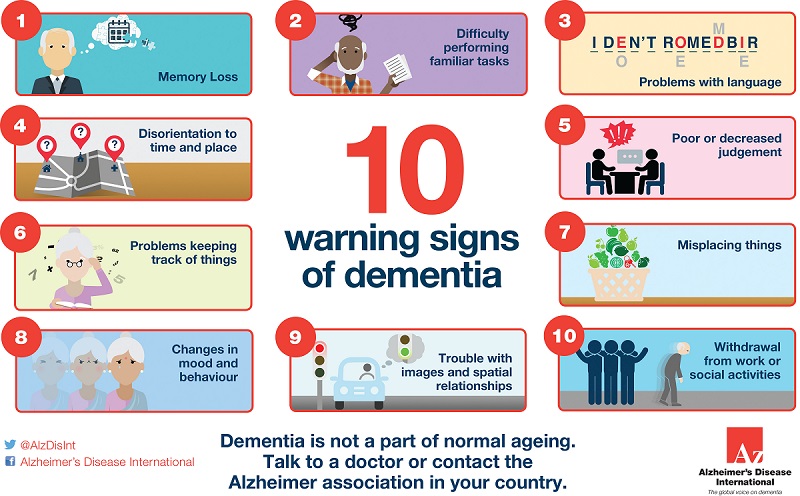
Every 3 seconds someone in the world develops dementia. But of this huge tide of people most do not receive a diagnosis – let alone treatment and care. In 2017, there will be an expected 10 million new cases of dementia. Most people with dementia live in low and middle income countries. As few as 10% of people living with dementia in these countries will receive a diagnosis.
More needs to be done to tackle the stigma surrounding this disease. Individuals who are diagnosed also often receive a lower standard of care and may face exclusion from everyday life. Without a diagnosis, people with dementia and their care partners are unable to access the treatment and support they need.
This World Alzheimer’s Month, we are calling on all people to recognize the warning signs of dementia so that they may seek advice and support as early as possible. A diagnosis of dementia made earlier in the course of the disease is fundamental to ensure that those affected can live as well as possible. Earlier diagnosis is important because:
- It enables people with dementia and their care partners to be better equipped to cope with progression of the disease, including the ability to make decisions about their independence, home and legal affairs while they still have the capacity to do so.
- It gives people with dementia a better chance to benefit from available drug and non-drug therapies that may improve their cognition and enhance their quality of life.
- When diagnosed early enough, it allows those affected to make a significant difference to research, by taking part in new clinical trials.
There is no simple test to make a diagnosis of dementia. A reasonably accurate diagnosis can be made by taking a careful history of the person’s problem from the individual alongside a close relative or friend, together with an examination of the individual’s physical and mental state.
More research into diagnosis of dementia is paramount, but has historically focused on patients already exhibiting dementia symptoms. Clinical trials performed in these people have been disappointing. Recent diagnostic efforts have begun to recognize the importance of a long pre-dementia stage in the disease, and favor the development of therapies and other interventions early in the disease progression. This suggests that as our understanding of the disease grows, early diagnosis will become ever more important. This must be accompanied by increasing healthcare capacity, and better care delivery.
The global plan on dementia adopted by the World Health Organization (WHO) in May 2017 urges that every government develop awareness of and access to diagnosis for dementia. The plan includes a target for 145 governments to have a national plan by 2025, but so far, less than 30 of the 194 WHO member states have developed a plan on dementia. Alzheimer associations in over 90 countries are engaged in advocacy to encourage the development of these plans, and also provide support and advice for seeking a diagnosis, and life after a diagnosis is made.
Dementia is not a normal part of ageing. You can share our ‘10 warning signs of dementia’ campaign graphic above. If yourself or anyone you know are worried about any of these symptoms, speak to a doctor or contact the Alzheimer association in your country.
All over the world people are helping spread these messages through thousands of activities. Join the World Alzheimer’s Month campaign by using the hashtag #WorldAlzMonth and visiting https://www.worldalzmonth.org/ to get involved.
ADI are proud partners with BMC.
One Comment